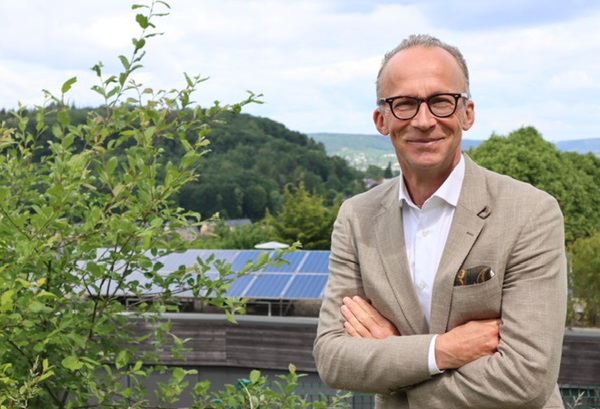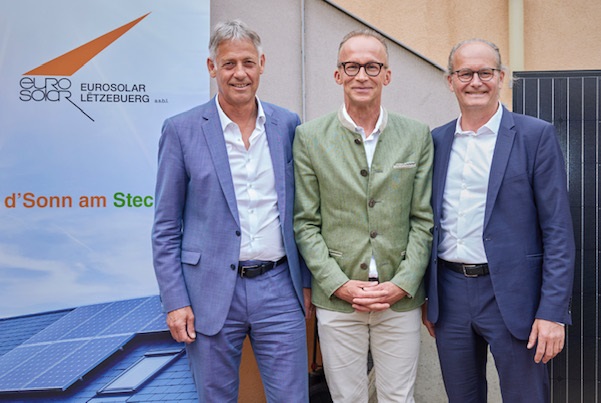 Paul Zens, President of Eurosolar Lëtzebuerg asbl;
Paul Zens, President of Eurosolar Lëtzebuerg asbl;
Chronicle.lu recently had the opportunity to speak with Paul Zens, President of Eurosolar Lëtzebuerg asbl, about the origins, evolution and priorities of this non-profit organisation which has been advocating the use of renewable energies for more than 20 years.
As Mr Zens explained, the idea behind Eurosolar Lëtzebuerg asbl actually dates to 30 years ago when some teachers from the Lycée des Arts et Métiers initiated projects together with their pupils “to show the potential and the many possibilities of solar cells”. In 2002, they decided to join Eurosolar e.V. – The European Association for Renewable Energy and became known officially as Eurosolar Lëtzebuerg asbl; on Friday 10 June 2022, the non-profit as it is known today celebrated its 20th anniversary at a special event in Beckerich.
Today, Eurosolar e.V. is composed of sections from fourteen European countries, all working independently, although they meet once or twice per year to keep each other informed. Paul Zens, who has served as President of Eurosolar Lëtzebuerg since 2020, noted that a representative of the wider European network was present at the Luxembourg section’s anniversary event on 10 June.
Mr Zens confirmed that the primary goal of Eurosolar Lëtzebuerg has remained unchanged for the past 20 to 30 years: to get rid of fossil fuels and nuclear energy and switch to renewables. He noted that 2022 also marks the 50th anniversary of the Club of Rome’s groundbreaking report which emphasised the need to rething growth on a finite planet. “But nobody listened”, said Mr Zens. “So, it was the same 30 and 20 years ago. We must get rid of these polluting energy sources and switch to renewables”. Whilst the main goal stayed the same, the non-profit’s priorities have shifted away from its founding members initially exploring renewable energies and being early adopters to becoming enablers or facilitators, who “spread the good news, how it works, what is possible, what we need to do and how it can be done”.
Eurosolar Lëtzebuerg has three missions: to be informed about the latest developments in renewable energies; to give its opinion and advice on new laws or rules; to spread the news and inform others. The latter is traditionally achieved through various activities such as meetings and seminars, although these were limited over the past two years due to the COVID-19 pandemic. Paul Zens was hopeful that the non-profit could organise in-person events again in the near future. In the meantime, Eurosolar Lëtzebuerg has developed a fortnightly podcast “D’Sonn am Stecker” (sun in the plug), during which Mr Zens invites guests to speak about different topics. Each podcast is 15 to 30 minutes long and most are in Luxembourgish, although there are also a couple in French. Most recently (10 June 2022), he spoke with Dr Andrew Ferrone, Head of the Meteorological department at Luxembourg’s Ministry of Agriculture, Viticulture and Rural Development and Luxembourg's representative to the Intergovernmental Panel on Climate Change (IPCC). “I’m learning with every podcast and I hope that people also learn with every podcast. It’s very varied”, stated Mr Zens.
Referencing the non-profit’s recently published paper “66,000 photovoltaic installations per day”, which (in a slightly exaggerated way) called for Western European countries to be less dependent on Russian oil and gas, among other things, Paul Zens said: “I think it’s just a good point to get rid of all these dependencies”. He added that this did not apply solely to Russia, but to other countries which are not known for respecting women’s rights or democracy.
Regarding Luxembourg’s dependency on imported energy – the country produces just 19.3% of its own electricity – Mr Zens stated: “I think it’s understandable that a country like Luxembourg, which is just so small, is buying somewhere; it has to buy somewhere”. However, he argued that Europe as a whole could and should “be largely independent only based on renewables. Renewables are a local product, on the one hand, according to the possibilities of a particular company – in Luxembourg, it’s biomass, wind and above all photovoltaics; in Spain, you have much more photovoltaics and sun power… We just need to get connected”.
He added that Luxembourg could do more to offset its carbon footprint and early Earth Overshoot Day (i.e. the date on which humanity’s demand for ecological resources in a given year exceeds what Earth can regenerate in that year), but that action was needed from everyone in society to achieve this: “If we want to reduce our dependency, everyone should make a little effort, or a big effort”. He explained that members of the public could contribute in two main fields: by installing solar panels on their roof and by spending less energy, such as walking or cycling instead of always taking the car.
“We are also aware that no government does more than [the Luxembourg] government for the energy transition”, he emphasised. “But it’s never enough and it’s never fast enough, and we need to speed up. We only have six to eight years to get things fixed”. He added that the municipalities in Luxembourg needed to make more of an effort in this domain, as well as companies, which “should rethink their way of producing”.
On the subject of mobility, he noted that various bus companies in Luxembourg were working hard to electrify their fleet; indeed, the sector must be climate neutral by 2030.
Regarding complaints from some consumers over an apparent shortage of electric vehicle charging infrastructure, Paul Zens said: “We must rethink our way of repowering a car”. He went on to highlight the differences between refuelling fossil fuel vehicles and electric cars, adding that the aim should also be to improve soft mobility so that driving is not always necessary. He added that society was quickly getting used to new mobile and other electronic devices, “so why shouldn’t we get used to other things?” That being said, he emphasised that new alternatives must be convenient for consumers.
He added: “What man- and womankind did [is] we took out a single thing which was profitable for us and we are exploiting it until the end and then we are astonished that the system, which is built up to work slowly, then collapses”.
Mr Zens concluded that the energy transition “is a common project, [which is] good for all of us, which must be done by all of us”.

Henri Kox, Honorary President of Eurosolar Lëtzebuerg asbl and Luxembourg's Minister of Housing, Paul Zens, President of Eurosolar Lëtzebuerg asbl, and Claude Turmes, Luxembourg's Minister of Energy, pictured at the non-profit organisation's 20th anniversary celebration on Friday 10 June 2022. Credit: Eric Devillet








